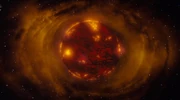The Genesis Planet was a planet located in the Mutara sector that was created from gaseous matter in the Mutara Nebula and the hull of the USS Reliant following the detonation of the Genesis Device. The detonation occurred at the conclusion of a fierce battle between Khan Noonien Singh and Admiral James T. Kirk in 2285. (Star Trek II: The Wrath of Khan)
History

Genesis' creation
Following the initial creation of the planet, Captain Spock's photon torpedo casing was launched towards it, following his funeral service. Because gravitational fields were in flux, his casing soft-landed on the planet's surface. (Star Trek II: The Wrath of Khan; Star Trek III: The Search for Spock)
The Genesis Planet immediately became a galactic controversy, and Starfleet declared it off limits until the Federation Council could decide what to do. In the meantime, the USS Grissom was dispatched with a scientific team that included the planet's co-creator, Dr. David Marcus, to carry out a thorough investigation.
A battle occurred in orbit during the final degradation of the planet in which both the USS Grissom and the USS Enterprise were destroyed and a Klingon Bird-of-Prey was co-opted by Admiral Kirk and his remaining crew. (Star Trek III: The Search for Spock)
In or about a year later, in an angry tirade directed at the Federation Council and the Federation President, the Klingon ambassador alleged that this planet would have housed a secret base from which Kirk would have launched a genocidal campaign using the Genesis Device against the Klingons. His allegations was debunked by Sarek who points out that Genesis was named for creation of life and that the Klingons shed the first blood in trying to possess it's secrets.(Star Trek IV: The Voyage Home)
Ecology
Initial scans of the new planet, from the Grissom, indicated several fascinating revelations, including "all the varieties of Earth's land and weather, within a few hours' walk," according to Dr. Marcus.
- Sector 1: Had foliage in fully-developed state of growth; temperature: 22.2 °Celsius
- Sector 2: Had desert terrain. Minimal vegetation; temperature: 39.4 °Celsius
- Sector 3: Had subtropical vegetation; temperature decreasing rapidly, indications of snow
The same effect that hyper-evolved the plant life on the planet seemed to have the same effect on microbes on the surface of the burial photon torpedo that soft landed on the planet shortly after it was created. The microbes evolved into multicellular organisms in a very short period of time.
Unstable protomatter, used in the matrix's construction by David Marcus in his haste to complete the Genesis Project, caused the ecosystems it had created to become dangerously erratic. This instability manifested itself first in an accelerated rate of growth, then in micro-climatic upheavals. Instead of flourishing, the planet began to experience heavy geologic activity that resulted in the entire surface becoming molten. (Star Trek III: The Search for Spock)
External link
- Template:NCwiki


